SCP0038
Amyloid β 1-42 rat
≥90% (HPLC)
Synonym(e):
β-Amyloid 1-42, Amyloid for Rat, Rat Amyloid β 1-42
Anmeldenzur Ansicht organisationsspezifischer und vertraglich vereinbarter Preise
Alle Fotos(1)
About This Item
Empirische Formel (Hill-System):
C199H307N53O59S1
Molekulargewicht:
4417.95
UNSPSC-Code:
12352200
NACRES:
NA.32
Empfohlene Produkte
Assay
≥90% (HPLC)
Form
lyophilized
Zusammensetzung
Peptide Content, ≥75%
Lagerbedingungen
protect from light
Lagertemp.
−20°C
Amino Acid Sequence
Asp-Ala-Glu-Phe-Gly-His-Asp-Ser-Gly-Phe-Glu-Val-Arg-His-Gln-Lys-Leu-Val-Phe-Phe-Ala-Glu-Asp-Val-Gly-Ser-Asn-Lys-Gly-Ala-Ile-Ile-Gly-Leu-Met-Val-Gly-Gly-Val-Val-Ile-Ala
Allgemeine Beschreibung
Amyloid β (Aβ) 1-42 is the major Aβ species in the amyloid plaques that develop in the case of Alzheimer′s disease (AD). It has a cross-β structure with parallel, in-register β-sheets.
Anwendung
Amyloid β 1-42 rat has been used as an amyloid β (Aβ) oligomer in intracerebroventricular (ICV) injection/intra-hippocampal infusion to establish the Alzheimer′s disease (AD) model in rat.
Biochem./physiol. Wirkung
Amyloid β 1-42 forms amyloid fibrils more readily compared to Aβ(1–40), in vitro. Aβ1-42 injections are known to cause brain dysfunction indicating learning and memory deficits. Amyloid β (Aβ) refers to peptides derived from amyloid precursor protein that vary in length from 37–43 amino acids. Aβ(s) peptides, their peptide fragments, and mutated fragments are used to study a wide range of metabolic and regulatory functions including activation of kinases, regulation of cholesterol transport, function as a transcription factor, and regulators of inflammation. Aβ(s) peptides and their peptide fragments are also used to study oxidative stress, metal binding, and mechanisms of protein cross-linking in the context of diseases such as Alzheimer′s disease and neurodegeneration.
Lagerklassenschlüssel
11 - Combustible Solids
WGK
WGK 3
Flammpunkt (°F)
Not applicable
Flammpunkt (°C)
Not applicable
Analysenzertifikate (COA)
Suchen Sie nach Analysenzertifikate (COA), indem Sie die Lot-/Chargennummer des Produkts eingeben. Lot- und Chargennummern sind auf dem Produktetikett hinter den Wörtern ‘Lot’ oder ‘Batch’ (Lot oder Charge) zu finden.
Besitzen Sie dieses Produkt bereits?
In der Dokumentenbibliothek finden Sie die Dokumentation zu den Produkten, die Sie kürzlich erworben haben.
Kunden haben sich ebenfalls angesehen
Jing Wang et al.
Molecular medicine reports, 23(6) (2021-04-22)
Ginkgolide B (GB), the diterpenoid lactone compound isolated from the extracts of Ginkgo biloba leaves, significantly improves cognitive impairment, but its potential pharmacological effect on astrocytes induced by β‑amyloid (Aβ)1‑42 remains to be elucidated. The present study aimed to investigate the
Enes Akyuz et al.
Biomedicines, 8(3) (2020-03-19)
Alzheimer's disease (AD) is a progressive neurodegenerative disorder with a complex etiology and characterized by cognitive deficits and memory loss. The pathogenesis of AD is not yet completely elucidated, and no curative treatment is currently available. Inwardly rectifying potassium (Kir)
Zhifeng Tian et al.
Journal of integrative neuroscience, 18(3), 309-312 (2019-10-12)
Alzheimer's disease is pathologically characterized by the presence of senile plaques and neurofibrillary tangles in the central nervous system. Amyloid β-protein is toxic to neurons and induces phosphorylation of Tau protein, which accumulates in paired helical filaments and leads to
Maryam Bagheri et al.
Neurobiology of learning and memory, 95(3), 270-276 (2010-12-15)
Alzheimer's disease (AD) is a debilitating neurodegenerative disorder characterized by increased β-amyloid (Aβ) deposition and neuronal dysfunction leading to impaired learning and recall. Ageing, heredity, and induced oxidative stress are among proposed risk factors. The increased frequency of the disease
Aynun N Begum et al.
Journal of Alzheimer's disease : JAD, 15(4), 625-640 (2008-12-20)
The rat amyloid-beta (Abeta) intracerebroventricular infusion can model aspects of Alzheimer's disease (AD) and has predicted efficacy of therapies such as ibuprofen and curcumin in transgenic mouse models. High density lipoprotein (HDL), a normal plasma carrier of Abeta, is used
Unser Team von Wissenschaftlern verfügt über Erfahrung in allen Forschungsbereichen einschließlich Life Science, Materialwissenschaften, chemischer Synthese, Chromatographie, Analytik und vielen mehr..
Setzen Sie sich mit dem technischen Dienst in Verbindung.
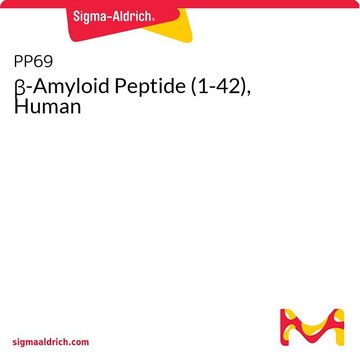




![[Gly22]-Amyloid β 1-42 Arctic human](/deepweb/assets/sigmaaldrich/product/images/222/254/58bfa018-4218-48a8-957d-f4d67366a533/640/58bfa018-4218-48a8-957d-f4d67366a533.jpg)

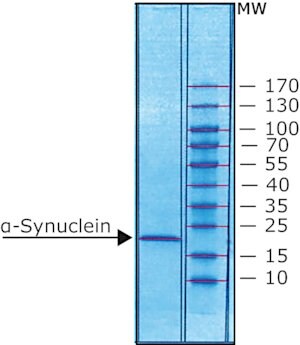
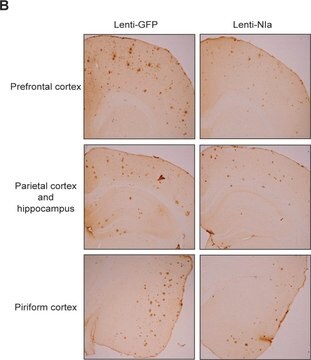



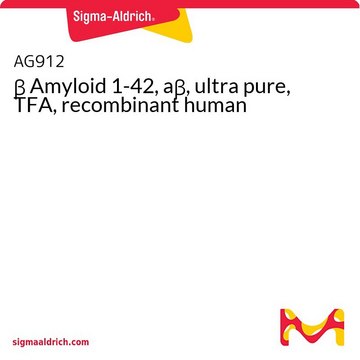

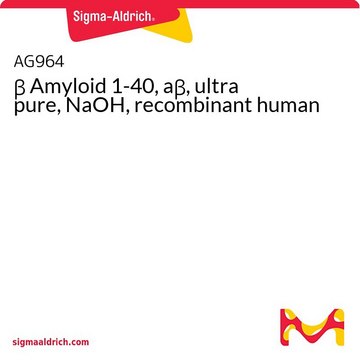
![[Ala28]-Amyloid β 25-35 ≥95% (HPLC)](/deepweb/assets/sigmaaldrich/product/images/306/938/dd9f7c72-cfca-4ea3-8e10-a7a2a7994639/640/dd9f7c72-cfca-4ea3-8e10-a7a2a7994639.jpg)